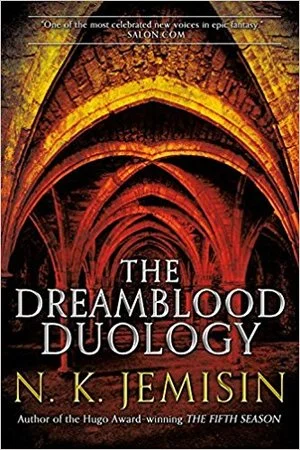Book Review: Waking Gods
Sleeping Giants was one of my favorite books of 2016, so you can understand my enthusiasm for Waking Gods. I even timed the other books I was reading so I finished one at lunchtime the day Waking Gods came out, leaving me room to pick it up right away.
Waking Gods begins approximately eight years after the events of Sleeping Giants. In that time, Kara and Vincent have become heroes in the public eye, and Themis a symbol of Earth's protection - until, that is, a new alien robot appears in the middle of London and vaporizes a section of the city. When Kara and Vincent defeat it, many more appear in major cities across the world and begin killing humanity with an inescapable gas. Our heroes try to fight a hopeless battle against technology superior to our own and struggle against their own demons.
One of the things I loved about Sleeping Giants was that it didn't pull any punches. Every few chapters, a new disaster occurred to emphasize the danger of meddling with technology so far beyond us. It beautifully mixed the joy of scientific discovery with the agony of fatal setbacks. Waking Gods has a different feel; where Sleeping Giants had moments of disaster, Waking Gods is one long string of horrific events.
It starts with the initial London attack and just rolls forward from there, with millions of people dying around the world. And Neuvel is smart. He knows that millions of people dying are just a number to us, so he drives it home with a death that you'll definitely care about.
At the same time, Neuvel reels us in with the personal struggles of the characters. Our mysterious interviewer and Rose talk with the descendants of the aliens and piece together why the aliens are attacking. Rose grapples with her "death" and reappearance, giving a meaningful discourse on what defines a person. Vincent and Kara come to terms with what Alyssa did at the end of the last novel and the consequences of her actions: namely, that they're parents of a young girl they've never met. The newest cast addition, the general in charge of the program running Themis, fights to convince world governments to respond appropriately to the catastrophes - and pick up the pieces when they don't.
It's all highly compelling and well-written. Neuvel feeds you just enough at a time to make the book un-put-downable; I was done with it in less than two days.
And oddly enough, I think the found footage, epistolary format works better here than it did in the first book. The usage of that form in the climax of the first book strained credulity, but it's a bit more reasonable here.
If the book has a single flaw, it's that the motives and actions of both the aliens and the aliens' descendants here on Earth are murky in places. The broad strokes work fine, but some of the minutiae feel...off. Some of that probably comes down to them being aliens, after all, and thus thinking differently than us, but it would help if we could actually meet and talk to the aliens.
Fortunately, based on the cliffhanger ending, that scene is likely coming. So we should all get excited for book three.
To sum, Neuvel's got another firecracker here that completely avoids the common problems of middle books and delivers on the promise of the first novel. Is it too soon to start speculating on this series becoming a classic of the genre?
Grade: 4.5/5
Memorable Quote:
“I don’t think Kara and Vincent would last very long against that machine, and if Themis is destroyed, it will surely be the beginning of the end for all of us.
I sincerely hope I’m wrong. I hope a hatch opens on that robot and lets out happy, oddly legged aliens who just want to hug everybody. Everyone at the EDC is so excited about making first contact, I try my best to hide my pessimism. They already think I’m on the verge of depression; they’ll start medicating me if I tell them how I truly feel.
But I can’t shake the feeling that something horrible is about to happen.”







